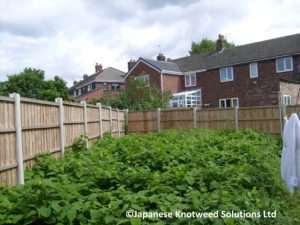
In a recent case heard at County Court in London, the plaintiff’s claim was dismissed, and the defendant found not to be liable for damages or loss of value to her neighbour’s property caused by Japanese knotweed. Furthermore, the plaintiff was ordered to pay the defendant’s legal costs, making her liable for a bill estimated to exceed £100,000. Ouch.
While the judge, Grahame Aldous KC, highlighted that the plaintiff had been ‘obstructive’ in the witness box – in contrast to the defendant (a ‘careful witness who was trying to assist [the judge]’) – the crux of the case seems to have been that the judge found it credible that the defendant had not known that…
the plants in her garden were Japanese knotweed, nor that they posed a significant problem.
While the plaintiff claimed that the defendant knew for years that Japanese knotweed was present in her garden and chose not to have it removed or dealt with, the defendant stated that she was not interested in gardening, and the court agreed that she had taken a reasonable approach to removing the knotweed once she became aware of it in 2017.
While there was also some suggestion from an expert witness (a Japanese knotweed specialist) that the plant had been present in the plaintiff’s garden, as well as the defendant’s, prior to 2017, the defendant’s insistence that she had known nothing about Japanese knotweed and was shocked to be told that it was present in her garden seems to have weighed significantly in the judgement – in other words, the defendant’s ignorance was (a part of) her defence.
While this case has been judged on its own merits, it does beg a few questions, including highlighting that although knowledge of Japanese knotweed, particularly among homeowners, has grown greatly since the UK press first started widely reporting on homeowners being denied mortgages in 2010 and the infamous Mail Online story “couple forced to demolish their home” in 2011, there is still something of a blind spot among homeowners as to the problems that this plant can cause.
What’s more, there’s ever-changing guidance from the government and organisations including RICS as regards Japanese knotweed on domestic properties and there is still no obligation for vendors of domestic properties to make reasonable enquiries into Japanese knotweed before answering the question on the TA6 conveyancing form “Is the property affected by Japanese knotweed?”. The question can still be answered “Not known”, meaning that caveat emptor is very much the watchword in any house purchase!
While we have heard claims before of similar sums to the £150,000 reduction in the property value claimed here, and while there have been significant County Court judgements and other settlements in respect of Japanese knotweed, it is not immediately clear in this case that the difference between the price received for the house and the valuation (which was potentially an estate agent’s valuation) was entirely due to the presence of Japanese knotweed.
Estimates suggest that the presence of Japanese knotweed on a domestic property can result in an average loss of value of 5% (which in the case above would represent around £55,000 based on the £1.1m valuation).
It’s also important to note that while Japanese knotweed treatment is costly in relative terms, herbicide treatment regimes lasting five years (or more), backed by insurance backed guarantees (generally of ten years duration) are available from reputable contractors for a few thousand pounds – and a total fee over £5,000 would be expected only for a very large infestation (either a large infestation on open land or infestation spread across multiple properties).
The additional loss in value (comparing a loss of £55,000 with remediation costs less than £5,000) is dependent on the prices that buyers are willing to pay, as well as valuation surveys. The discrepancy is assumed to represent the loss of amenity (including ability to use affected areas during the treatment program) the potential for re-infestation from Japanese knotweed on adjacent properties and the potential effect on re-sale value (which is something of a chicken-and-egg question, if you think about it!).
While INNSA is firmly behind homeowners who take reasonable measures to remediate Japanese knotweed on their property and doesn’t feel that they should be punished for doing this – and while furthermore we are against a culture of frivolous litigation, particularly where remediation can be put in place for a fraction of the cost of legal proceedings, we would not want to see a situation develop where feigning ignorance becomes de rigeur in order to try to evade responsibility for managing invasive species or to defend against knowing inaction on such a problem.
In any case, if you thought the moral of this story was going to be about ignorance – it’s absolutely not… it’s the old chestnut “when two people go to court, the lawyers always win”.
